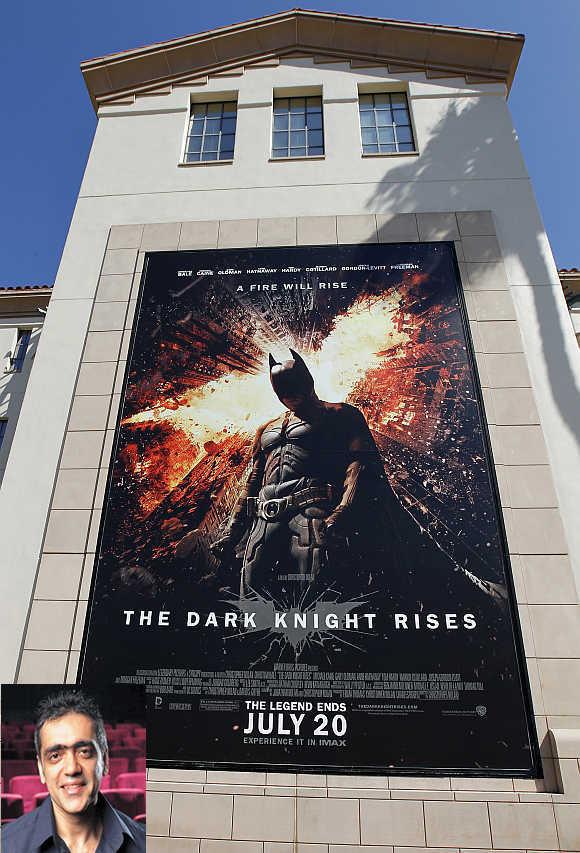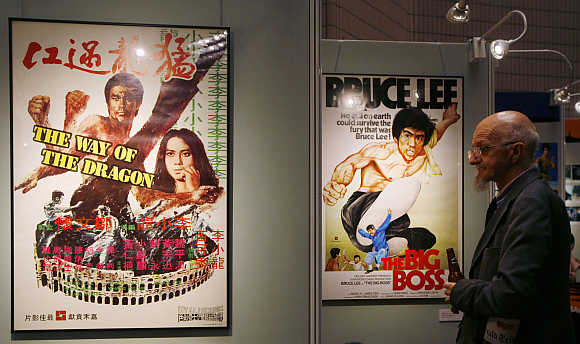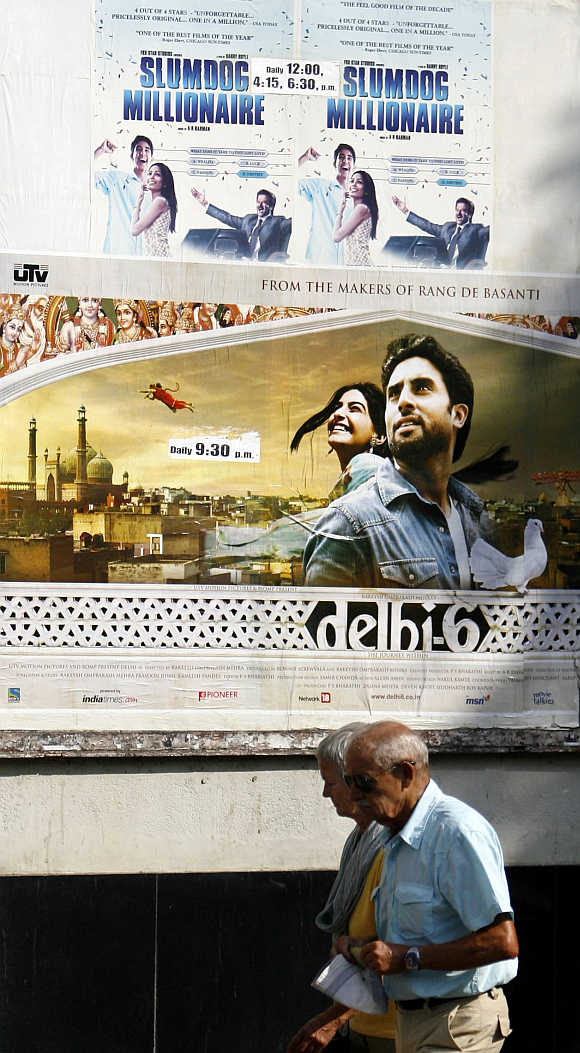Photographs: Fred Prouser/Reuters Surajeet Das Gupta in New Delhi
On November 30, Ajay Bijli, the promoter of the multiplex chain PVR, had forgotten his wallet at home. As he scrambled from one meeting to another to explain the deal he had signed to acquire Cinemax, a rival multiplex operator, he joked: "I have no money (because) I have paid everything to the Kanakias (the promoters of Cinemax)."
There's no way to tell if the deal has indeed left Bijli penniless. But, the money involved is truly big. PVR has bought 69.27 per cent of the promoter's stake held by the Kanakias in Cinemax for Rs 395 crore (Rs 3.95 billion).
PVR, of course, also has to pick another 26 per cent in the company through the mandatory open offer, which can take the cost of the acquisition to over Rs 560 crore (Rs 5.60 billion).
It's a deal that has catapulted Bijli to the top spot in the business in the country, a position he had lost in the past few years, first to Inox Leisure and then to Anil Ambani's BIG Cinemas. PVR was pushed to the third spot.
Bijli, who introduced multiplex theatres in the country in the 1990s with Australia's media company, Village Roadshow, admits he was feeling the heat: "You cannot rest on your laurels; what matters is what you are today, not what you were in 1997."
...
Ajay Bijli: Making of the multiplex king
Image: Bijli got out of the cinema production business because one of his movies crashed at the box office.Photographs: Keith Bedford/Reuters
It is not that he did not try the inorganic route to growth - he was unable to close the acquisitions that came his way. In 2009, he had struck a deal to buy DLF's 26-odd screens in and around Delhi in a cash-cum-equity deal, but, the real estate developer backed out at the last moment. He also made an attempt to buy out multiplex chain Fame, but was outbid by Inox.
But, this time, Bijli left nothing to chance. Actis, the private equity fund, was also known to be keen to acquire Cinemax. But, it was he who walked away with Cinemax. Bijli (the surname comes from his grandfather, who was very active in the rehabilitation of refugees; his electrifying energy earned him the nickname, Bijli Pehalwan) says he had been talking to the Kanakias for nearly three years, but it was only six month back that the family, which is into real estate and hotels, decided this was not their core business.
The Kanakias had, therefore, demerged the multiplex business from the other businesses. That was a clear signal that the Kanakias were looking for a buyer for Cinemax. Bijli is a conservative businessman who is unlikely to ever squander money. After all, despite blockbusters like Taare Zameen Par and critical acclaim, he had decided to get out of the cinema production business because one of his movies crashed at the box office and he lost a lot of money.
...
Ajay Bijli: Making of the multiplex king
Image: Taare Zameen Par was a blockbuster.Photographs: Stringer/Reuters
He admits he lost his appetite for the business after that and decided to stick to business he knew best. Even in the Cinemax deal, he has preferred to follow a consortium approach to finance the Rs 560-crore (Rs 5.60 billion) acquisition. He has thus roped in two private equity partners: L Capital, which belongs to the French luxury house LVMH, and Multiples Alternate Asset Management (Multiples), run by Renuka Ramnath, someone who had earlier funded Bijli when she headed ICICI Venture.
Together, the two funds are putting in Rs 235.3 crore (Rs 2.35 billion) into the acquisition. In return, they will get a stake of 15 per cent in PVR. For the rest of the money, Bijli has raised a debt of Rs 240 crore (Rs 2.4 billion) from three players: L&T Finance, GE Capital and Indo Star. Another Rs 60 crore (Rs 600 million) will come from the company's internal accruals.
Bijli's contribution will be Rs 25 crore (Rs 250 million) towards the equity of the company. This might help Bijli spread the risks over a large number of stakeholders, but he knows he will have to pay the price for being so conservative: The promoter's equity in PVR will get diluted from 40.2 per cent to 32 per cent after this deal.
...
Ajay Bijli: Making of the multiplex king
Image: The deal gives him immense clout with producers.Photographs: Charles Platiau/Reuters
But, that does not worry Bijli too much, because the deal gives him immense clout with producers who are known to squeeze a large share of the revenue from exhibitors. After all, Bijli will control over a third of the 1,200-1,300 multiplex screens in the country and as much as 20 per cent of all box office revenues. So, no producer can afford not to screen his movies in his halls and get a blockbuster hit. And, any big-budget movie, which is generally shown in over 1,000 screens, has no option but to deal with PVR.
In other words, Bijli can make or break a movie. PVR will be able to recover a part of the investment in Cinemax from the producers. Bijli, on his part, underplays his new-found clout with the producers and says the real gain from the Cinemax acquisition is that it will give him geographical reach, as well as strengthen his position in many key markets.
For instance, it will help him expand his footprint from 27 to 36 cities in one go. Also, it will make him the uncrowned king of Mumbai - one of the most lucrative movie markets in the country - after being the biggest player in Delhi for many years.
...
Ajay Bijli: Making of the multiplex king
Image: Some analysts say he might have over-leveraged himself to finance the deal.Photographs: Bobby Yip/Reuters
PVR will more than double its overall seat capacity from 8,222 to 19,999 in Mumbai, as Cinemax is a strong player with properties in excellent locations. PVR will also be able to enter new markets, where it had no presence before the acquisition: Nashik, Malegaon, Rajkot, Kochi, and Kanpur, for instance.
Yet, some analysts say he might have over-leveraged himself to finance the deal. And, that he has paid too much, about Rs 4 crore (Rs 40 million) for each screen, nearly a double of what building a new screen would cost. But, Bijli says the premium is justified, as a new screen would take at least 12-24 months to build, and the acquisition cuts the go-to-market time drastically.
Also, Cinemax has locations which are very hard to get. Bijli says he is looking for an Ebitda (earnings before interest, tax, depreciation and amortisation) margin of 25 per cent at the unit level and a payback after three to four years, which should sail him through.
But, for now, Bijli wants to ensure that he does not lose the substantial lead that the acquisition of Cinemax has given him (his nearest competitor, the Inox-Fame combine, has 256 screens). By the end of this financial year, PVR and Cinemax together will add another 60 screens across the country and substantially increase footfall in their halls.
...
Ajay Bijli: Making of the multiplex king
Image: In the first six months of this year, PVR attracted 16 million moviegoers to its screens.Photographs: Arko Datta/Reuters
In the first six months of this year, PVR attracted 16 million moviegoers to its screens, but, now, together it hopes the number will jump to 56 million by the end of this financial year (PVR alone would have done around 32 million) and 78 million in two years. Bijli is not averse to keeping the two brands separate in most of the cities.
"Globally, it is not unusual to have two three different brands. However, in some places, like in Delhi, where Cinemax has one property, it makes sense to call it PVR as that would reduce costs," says Bijli.
He is also looking at ways to increase revenues by using innovative ways of marketing, rather than extracting more revenue share from producers. For instance, in Bangalore, PVR recently offered tickets for Rs 100 on Wednesday and attracted about 7,000 viewers on that day. This also, of course, had a rub off effect on its food & beverage income, which is generally 20 per cent of the income from each viewer.
In Delhi, in some properties, PVR offers tickets for Rs 50 for the morning shows to attract more crowd. In 2005, Bijli was watching a movie in one of his halls in Delhi when he got an SMS from his friend saying the Ambanis, through Adlabs, were entering the exhibition business.
"The news shook the industry, as till then this was a small- and medium-level business, which had not attracted big companies. But, it was also a vindication that we were in the right business," he says. With the Cinemax acquisition, it is also a vindication of Bijli's belief in a business which he began from scratch 17 years ago.








article